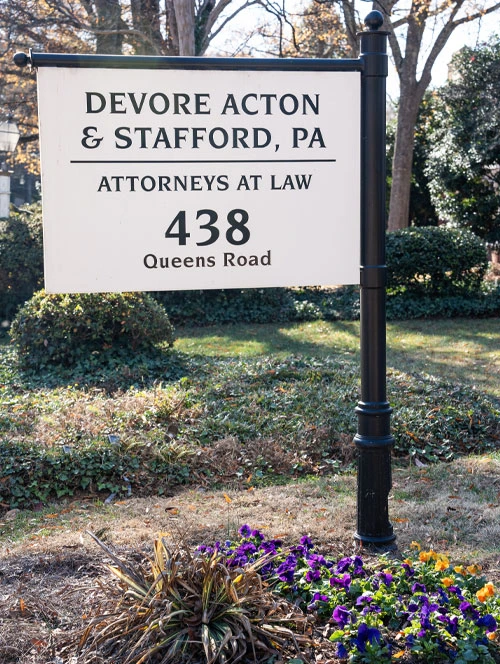North Carolina Eminent Domain Attorney
North Carolina Eminent Domain Lawyer
Owning your own piece of property can be a sign of accomplishment. Whether newly acquired or passed down through the generations, a piece of residential or business property can be a great reward for hard work.
However, there is a misconception that our property is strictly ours and that no one may interfere with it so long as we own it. Unfortunately, the Fifth Amendment to the United States Constitution provides the government with the right to take land from property owners for the benefit of public use as long as they provide just compensation. This is known as eminent domain.
For the residents of North Carolina, this can leave an uneasy feeling about the land that they thought was solely theirs. At DAS Law Group, P.A., our attorneys know that property owners still have rights that allow them to fight back against such practices. While property owners cannot outright refuse the process, there are steps that our attorneys can help with. This could ensure that you receive proper compensation for your property or deter the process altogether.
Is Eminent Domain Legal in North Carolina?
Eminent domain is a legal practice afforded to state and federal government entities, as well as corporate utility companies. It allows them to take property owned by individuals and citizens to redevelop it into an area for public use. To obtain the property, the government must show proof that the land will be used for any number of public projects, such as:
- Transportation, such as roads, highways, or bridges
- Infrastructure, such as public works buildings
- Expanding or assisting with the water supply
- Building a public park
- Enhancing environmental protection
- Preserving a historical site
- Usage for military practices, power infrastructure, utilities etc.
This list is certainly not exhaustive, but it provides a representation of the types of projects that the government may seize land for. Unfortunately, there are many cases where the land is taken with good intentions, only to end up in the hands of private corporations or entities.
The right to take this land, however, is protected by both state and federal laws, including the Constitution of the United States. Under the Fifth Amendment, it states that private property shall not be taken without proper compensation. Under this amendment, both the necessity of the land for public use and the appropriate compensation must be met for the government to successfully use eminent domain. It is these two areas in which a property owner can fight back against policies that may be unjust.
However, eminent domain cases are very difficult to fight against, given the Supreme Court’s ruling in the case of Kelo v. New London in 2005, which provided that eminent domain can be used to acquire land that, in turn, could be used for private development. This was because the government argued that using the land for private use would generate additional economic stimulation in the area. However, legislatures in North Carolina sought to prevent this from happening to its citizens and passed a state house bill to protect them. It countered all state and local laws that allowed eminent domain to be used to secure land for a business under the argument that it would improve the economy.
The case also highlighted the problems associated with how eminent domain claims begin. Homes and property must be condemned for the eminent domain claim to move forward. However, because Kelo v. New London was supported for financial reasons, it basically made the case that any business that wasn’t as economically successful as another business could be condemned by the government to make room for a more lucrative entity. Nevertheless, the property in question may not fit the definition of condemned that many would agree with.
What Is the Process for Eminent Domain in North Carolina?
Once the decision has been made by the government to begin an eminent domain case, they will begin by announcing the project and the location on which the project will take place. This will be done prior to the landowner being contacted, though that will soon follow the announcement. An inspector will then visit the property to determine the value of the land through an appraisal process. After this, an offer will be made to the homeowner based on what is believed to be its fair market value.
The next step can seem a bit confusing because, as a landowner, you can accept or reject the offer that you received. However, rejecting the offer does not mean that the property will not be taken. When the owner rejects the offer made by the government, the land can still be taken and the offer is simply placed into an escrow account until the transaction is settled, at which point the landowner is paid.
A rejected offer, however, allows the property owner time to challenge the eminent domain claim on one of two grounds:
- They can challenge the use of the land for public use, making the case that it will be used for private business instead.
- They can contest the offer made for the land, showing that it was below the property’s fair market value.
Should you counter the offer made by the government, your attorney will ask that the transaction be reviewed by a commission, who will reinforce the claim that the offer is valid or provide an alternative settlement.
If the offer is still not acceptable to the property owner, they have the right to challenge the eminent domain claim in court. Unfortunately, most eminent domain claims are not preventable. Filing a claim in court against it may only yield a greater settlement to the landowner.
Why Do You Need an Attorney for Your Eminent Domain Case?
You may be inclined to handle your eminent domain case without the help of an attorney because it could save you money when you were forced into the situation in the first place. However, in cases such as these, it is even more important to have the legal representation you deserve when the forces arrayed against you seem insurmountable.
Attorneys who litigate eminent domain cases understand the challenges associated with them and work to ensure that their clients are advocated for. The attorney’s priority is to see that their client’s interests are not being taken advantage of. They can tell if the compensation that was offered is unfair or if the government is attempting to seize property for reasons other than the public benefit. Attorneys know that the goal of the government or representing agency is to gain the property for as little financially as possible, and they will usually start your case by challenging this.
Working with their professional resources, such as real estate agents, property appraisers, and other industry experts, they can research the property, documents, and history to look for comparable places that will increase the value. Although there are ways to research this information independently, unfortunately, the entities you are arguing against may be vast and have their own team of experts ready to challenge back. Attorneys and their professionals know the common issues and can help to avoid them. The process is designed to create a more favorable outcome by:
- Fairly appraise the property with independent parties.
- Ensure that the compensation reflects not only the amount of the land but also any amount that is impacted by the acquisition.
- Work with others who can provide testimony and evidence as to the value of the land.
If you are hesitating to challenge your eminent domain case because of financial reasons, you should rest assured that, in the majority of these cases, the final compensation and settlement include attorney fees paid for by the government rather than out of your own pocket.
What About My Business?
In an eminent domain case that impacts an operating business, you should know that the compensation package does not include money for your business. The value of your business is not taken into account, only the value of the land. However, in some cases, an attorney can argue that you deserve additional compensation to help with relocation costs. While not guaranteed, your attorney may be able to argue for some additional compensation for the structure itself.
North Carolina Eminent Domain Attorney
If you or your loved one are on notice from the government that they are seeking to acquire your property, speak with an attorney as soon as possible. Do not accept any offers or contact the government prior to doing so. You deserve representation from the beginning to ensure that your rights as a property owner are protected.
At DAS Law Group, P.A., our attorneys understand that you deserve this protection, and we put our clients’ interests first. With our experience, we can challenge the shortcomings of the eminent domain process to ensure that you are treated fairly and receive just compensation for what you worked so hard to obtain. No matter where you live in North Carolina, our firm is ready to help. Contact our offices today and speak with one of our lawyers. We are ready to support you.
It is also possible that you are subject to a partial taking, which means not all of your property will be subject to the condemnation action. Our attorneys can help navigate the value of a partial taking, particularly when the land that remains after the taking is significantly reduced in value. Furthermore, it is possible what one entity claims is only a partial taking is actually a complete taking.

request your consultation
"*" indicates required fields


